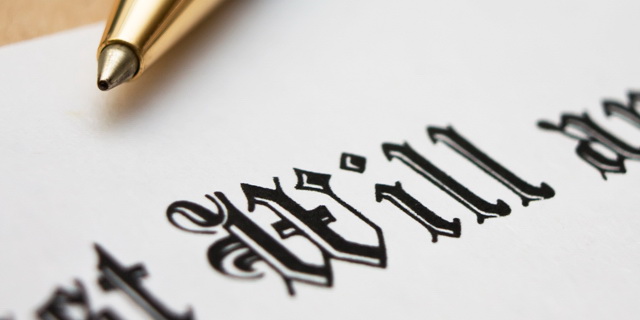If you plan to make a will, make sure it is error-free, since some common, often overlooked things can result in a will being subject to legal battles. Here’s how to avoid common mistakes while making a will in India.
Making a Will is important as it will make sure your estate is distributed well, once you are not around to do so. However often times there are certain mistakes that creep in unknowingly while writing a will in India, that may result in the will either being null and void, or being challenged in court or it may not result in proper distribution of your estate. In any case, it means a lot of hassles and heart burns for your loved ones. There are simple thing however that you can keep in mind to avoid some Common Mistakes while making a Will in India:

1. Signature and Witnesses:
The most important aspect of a Will is a valid signature of the person making the Will. Since a Will can be written even on a blank paper, signature is the only genuine authoritative thing in it. Although this is very rare for a person to not sign a will, however a common mistake while writing a will in India is to not sign fully and just sign in short or initials. This is not valid. A proper full signature of the person is required for a Will to be Valid.
The other aspect of it is the Witnesses. There need to be two Witnesses for a will and even they should sign in full and their names and details should be mentioned in the will next to where they sign. Also make sure that the Witnesses are NOT the beneficiaries in the will or there can be legal issues and questions of vested interests can arise in your absence. It is always advisable to avoid the Witnesses who are benefitting from the Will in any way.
2. Date:
Always, always Date your will. Date will make sure that the will is a latest one and also it is legally required. Not dating a will is a mistake while making a will.
3. Periodic Updates:
Update your will from time to time or whenever there is a change in your assets. For instance if you buy or sell a property or encash some shares or mutual fund units etc, anything that will result in a change in your assets or affect the composition of your portfolio, should be updated in your Will and the words that THIS WILL SUPERSEDES ALL PREVIOUS WILLS should be mentioned above. Again, Date is crucial to determine it is an updated will.
4. Not using proper Names:
We often call our loved ones with nicknames or short names. However it is one of the most common mistakes to avoid while making a will in India. A legally acceptable will requires you to mention Full Legal Name of the Beneficiaries with Date of Birth and place of residence to ensure it is the same person in question that you intend. Improper use of names or incomplete information to identify a person in a Will is a mistake and should be avoided.

5. Not mentioning proper distribution of Assets:
Improper mentioning of Assets is a mistake in a will. Also not mentioning proper distribution can result in unnecessary disputes and hassles later on. For instance if you have a property whose current value is Rs. 1 Crore, then mentioning that your two children get 50 Lac each after you are gone from the sale of property is a BIG mistake. Rates fluctuate and hence, mentioning an amount in a Will is a mistake; if you want to distribute the property, distribute it in percentages and not monetary value. Percentages do not fluctuate. So even if you want equal distribution mention, the X and Y get 50% each of the said property or 40%-60% or whatever ratio but in percentage terms. Same goes for all your assets and also make sure that you mention every detail of the asset in question so as to avoid any confusion as to which asset is being distributed. Refer here for details.
6. Passing it to Unborn Individuals:
A will can be made only for people who exist and are alive. You cannot have a provision for an unborn individual in your Will. For instance, Your will cannot mention that if and when your Son/Daughter may have a child, that child would also get X amount of share of property or anything in your Will. It is not legally acceptable since as mentioned above, the name of that individual is unknown and also it is not legally admissible to mention any benefit for an unborn individual in a Will. If you do so then it amounts to a mistake while writing a Will in India.
7. Infinite Inheritance:
Just because you cannot mention any unborn individuals in your will, you also cannot have beneficiary/beneficiaries beyond the ones who are alive and exist at time of execution of the will. For example you can very well mention in your will that your Daughter will inherit your house and also in her absence your granddaughter. You however cannot mention that once your grand daughter is no more, her daughter/son will inherit the property from them, if they are not in existence at the time of will; that is you cannot keep passing on your will from generation to generation. It has to be for a finite period of time in the sense that it only covers people in existence currently.
8. Ignoring the Joint Accounts:
If you mention in your will that X will be the beneficiary in your will and get the cash in your Bank account no xxxxx, then in that case you need to make sure that there are no joint account holders in that bank account; because if there are any, then legally they will get the access to the bank account even if you have mentioned otherwise in your will. Surviving Joint Account holders are the natural owners of the account and even if it is mentioned in a Will that they are not, it does not hold true legally. So make sure you keep this in mind while making a will in India. In case there is a joint account, make sure you change the joint ownership while you are alive, and only then mention anyone else in the will. Ignoring this fact is one of the mistakes to avoid while making a will in India. This condition also holds true for any Joint Account Holders in a Demat, Mutual Fund or other assets. Make sure to keep this point in Mind.
Leave a Reply